Organisational Behaviour Report: M&S and Motivational Theories
VerifiedAdded on 2023/01/24
|14
|4232
|64
Report
AI Summary
This report delves into the realm of organisational behaviour, using Marks & Spencer (M&S) as a case study to illustrate key concepts. It explores the influence of organisational culture, power dynamics, and political behaviour on both individual and team performance. The report examines Handy's typology of organisational culture, various forms of power as per French and Raven's model, and the impact of organisational politics. Furthermore, it analyses the impacts of content and process theories of motivation, including Maslow's hierarchy of needs, Herzberg's two-factor theory, and Vroom's expectancy theory, to understand how to improve motivation levels within an organisation. The report also discusses the differences between effective and ineffective teams, and concludes with a discussion of the concepts, philosophies, and theories associated with organisational behaviour.
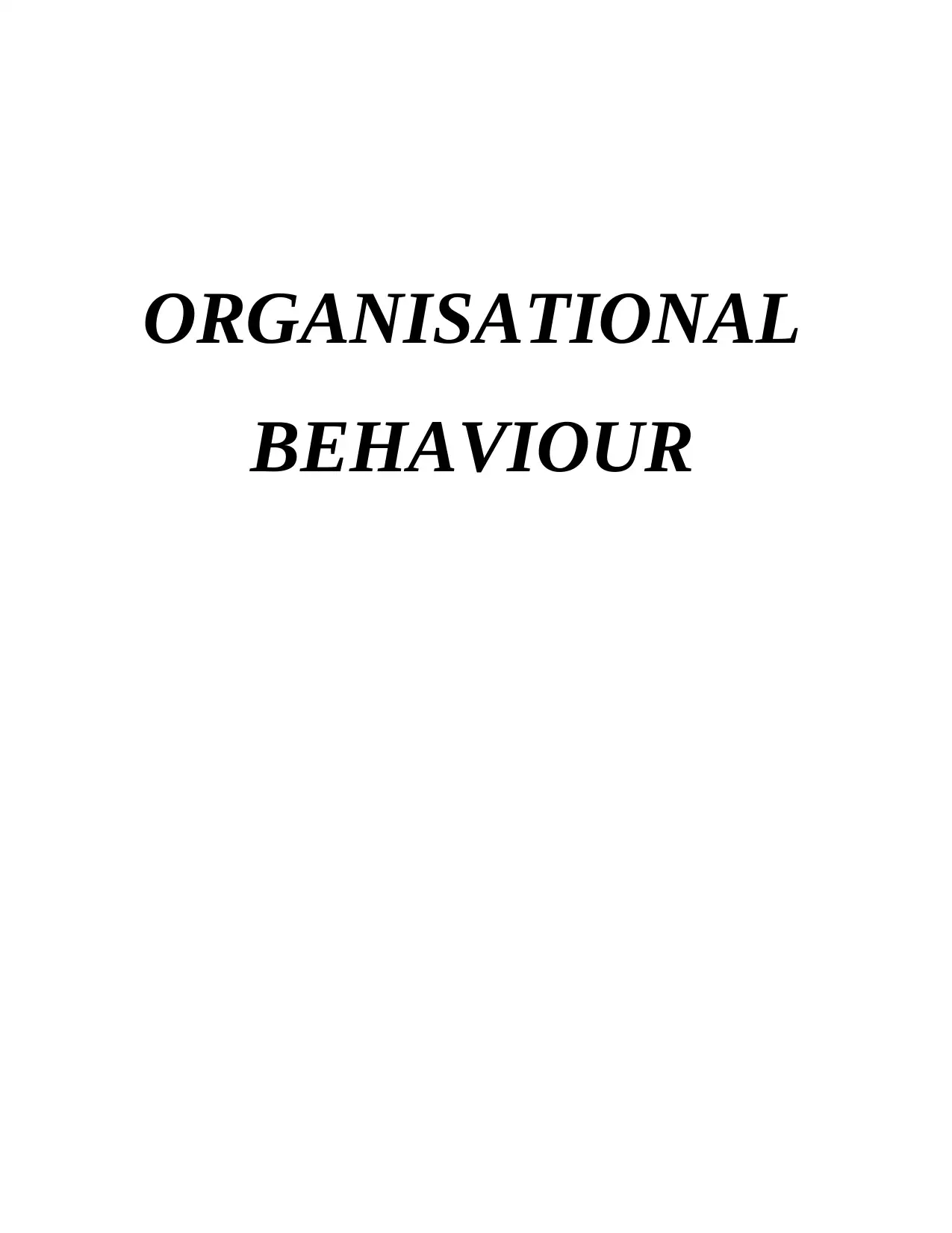
ORGANISATIONAL
BEHAVIOUR
BEHAVIOUR
Paraphrase This Document
Need a fresh take? Get an instant paraphrase of this document with our AI Paraphraser

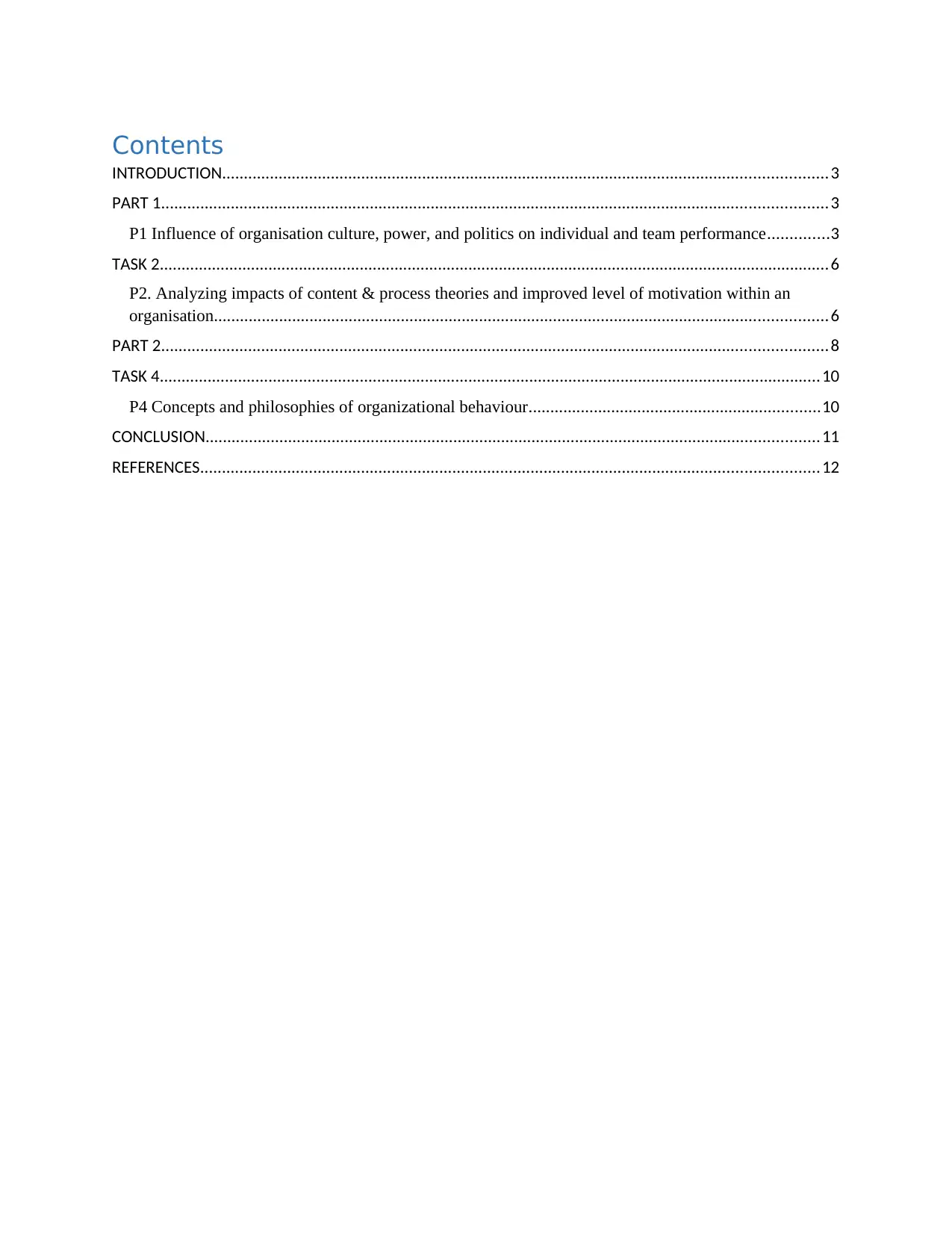
Contents
INTRODUCTION...........................................................................................................................................3
PART 1.........................................................................................................................................................3
P1 Influence of organisation culture, power, and politics on individual and team performance..............3
TASK 2..........................................................................................................................................................6
P2. Analyzing impacts of content & process theories and improved level of motivation within an
organisation.............................................................................................................................................6
PART 2.........................................................................................................................................................8
TASK 4........................................................................................................................................................10
P4 Concepts and philosophies of organizational behaviour...................................................................10
CONCLUSION.............................................................................................................................................11
REFERENCES..............................................................................................................................................12
INTRODUCTION...........................................................................................................................................3
PART 1.........................................................................................................................................................3
P1 Influence of organisation culture, power, and politics on individual and team performance..............3
TASK 2..........................................................................................................................................................6
P2. Analyzing impacts of content & process theories and improved level of motivation within an
organisation.............................................................................................................................................6
PART 2.........................................................................................................................................................8
TASK 4........................................................................................................................................................10
P4 Concepts and philosophies of organizational behaviour...................................................................10
CONCLUSION.............................................................................................................................................11
REFERENCES..............................................................................................................................................12
⊘ This is a preview!⊘
Do you want full access?
Subscribe today to unlock all pages.

Trusted by 1+ million students worldwide
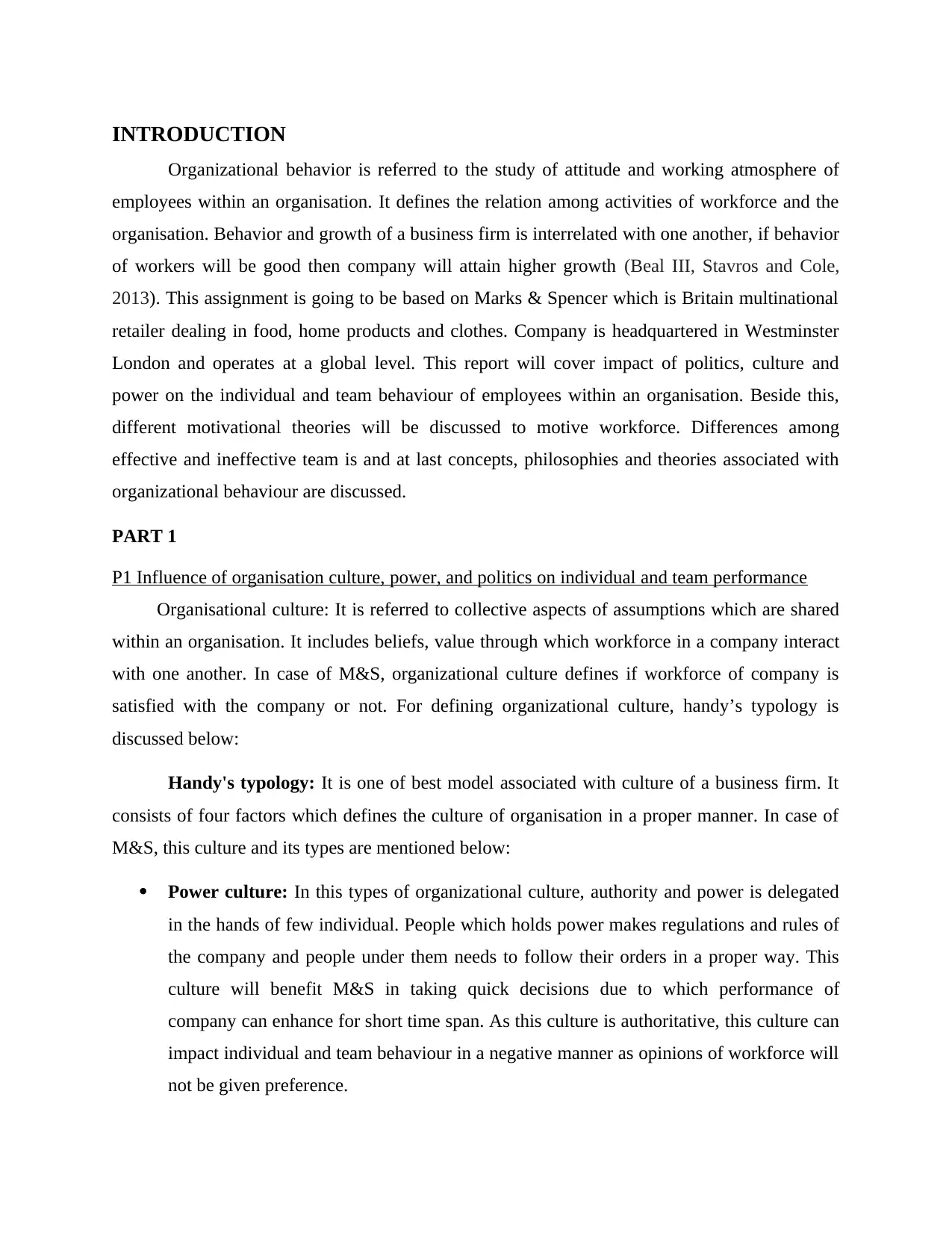
INTRODUCTION
Organizational behavior is referred to the study of attitude and working atmosphere of
employees within an organisation. It defines the relation among activities of workforce and the
organisation. Behavior and growth of a business firm is interrelated with one another, if behavior
of workers will be good then company will attain higher growth (Beal III, Stavros and Cole,
2013). This assignment is going to be based on Marks & Spencer which is Britain multinational
retailer dealing in food, home products and clothes. Company is headquartered in Westminster
London and operates at a global level. This report will cover impact of politics, culture and
power on the individual and team behaviour of employees within an organisation. Beside this,
different motivational theories will be discussed to motive workforce. Differences among
effective and ineffective team is and at last concepts, philosophies and theories associated with
organizational behaviour are discussed.
PART 1
P1 Influence of organisation culture, power, and politics on individual and team performance
Organisational culture: It is referred to collective aspects of assumptions which are shared
within an organisation. It includes beliefs, value through which workforce in a company interact
with one another. In case of M&S, organizational culture defines if workforce of company is
satisfied with the company or not. For defining organizational culture, handy’s typology is
discussed below:
Handy's typology: It is one of best model associated with culture of a business firm. It
consists of four factors which defines the culture of organisation in a proper manner. In case of
M&S, this culture and its types are mentioned below:
Power culture: In this types of organizational culture, authority and power is delegated
in the hands of few individual. People which holds power makes regulations and rules of
the company and people under them needs to follow their orders in a proper way. This
culture will benefit M&S in taking quick decisions due to which performance of
company can enhance for short time span. As this culture is authoritative, this culture can
impact individual and team behaviour in a negative manner as opinions of workforce will
not be given preference.
Organizational behavior is referred to the study of attitude and working atmosphere of
employees within an organisation. It defines the relation among activities of workforce and the
organisation. Behavior and growth of a business firm is interrelated with one another, if behavior
of workers will be good then company will attain higher growth (Beal III, Stavros and Cole,
2013). This assignment is going to be based on Marks & Spencer which is Britain multinational
retailer dealing in food, home products and clothes. Company is headquartered in Westminster
London and operates at a global level. This report will cover impact of politics, culture and
power on the individual and team behaviour of employees within an organisation. Beside this,
different motivational theories will be discussed to motive workforce. Differences among
effective and ineffective team is and at last concepts, philosophies and theories associated with
organizational behaviour are discussed.
PART 1
P1 Influence of organisation culture, power, and politics on individual and team performance
Organisational culture: It is referred to collective aspects of assumptions which are shared
within an organisation. It includes beliefs, value through which workforce in a company interact
with one another. In case of M&S, organizational culture defines if workforce of company is
satisfied with the company or not. For defining organizational culture, handy’s typology is
discussed below:
Handy's typology: It is one of best model associated with culture of a business firm. It
consists of four factors which defines the culture of organisation in a proper manner. In case of
M&S, this culture and its types are mentioned below:
Power culture: In this types of organizational culture, authority and power is delegated
in the hands of few individual. People which holds power makes regulations and rules of
the company and people under them needs to follow their orders in a proper way. This
culture will benefit M&S in taking quick decisions due to which performance of
company can enhance for short time span. As this culture is authoritative, this culture can
impact individual and team behaviour in a negative manner as opinions of workforce will
not be given preference.
Paraphrase This Document
Need a fresh take? Get an instant paraphrase of this document with our AI Paraphraser
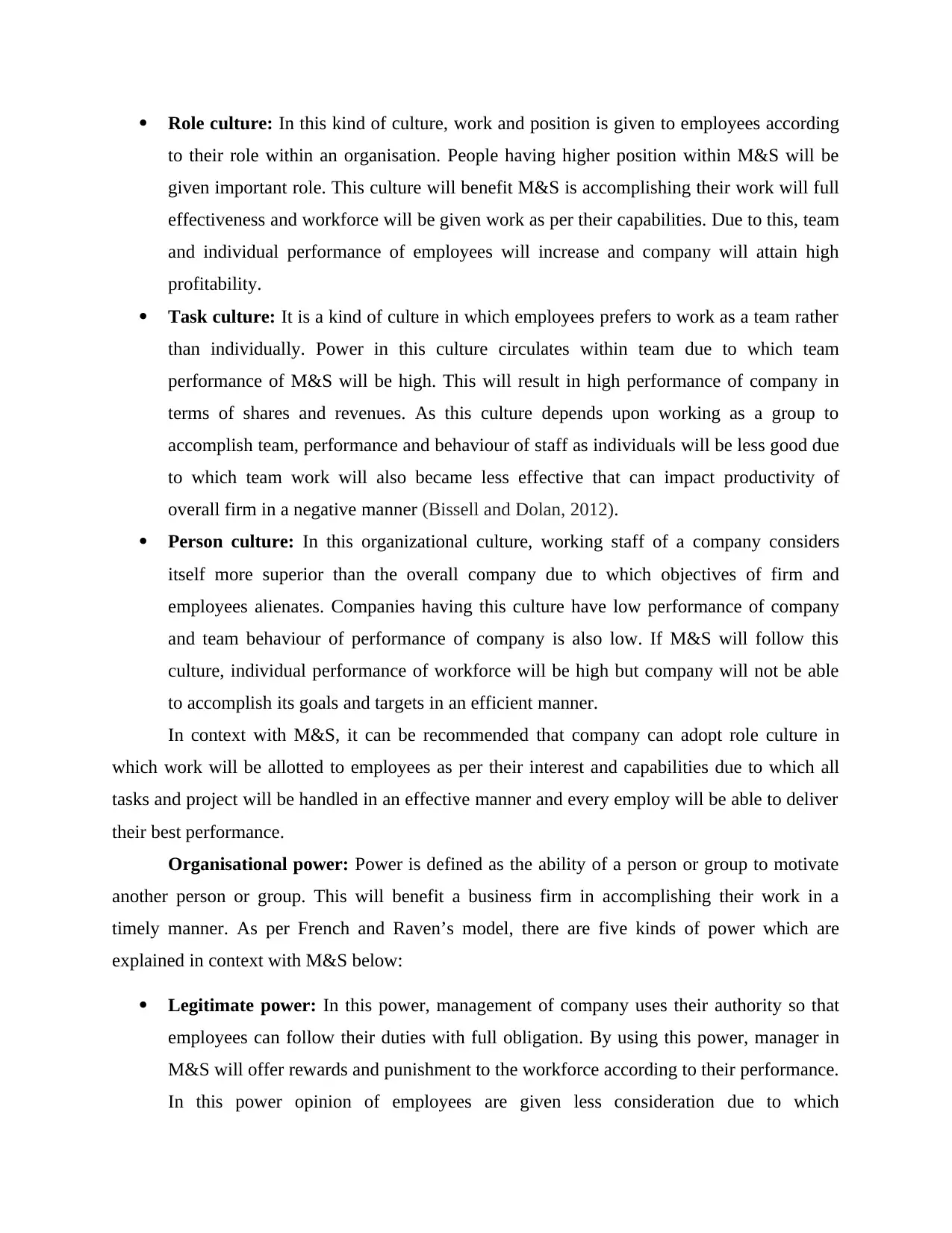
Role culture: In this kind of culture, work and position is given to employees according
to their role within an organisation. People having higher position within M&S will be
given important role. This culture will benefit M&S is accomplishing their work will full
effectiveness and workforce will be given work as per their capabilities. Due to this, team
and individual performance of employees will increase and company will attain high
profitability.
Task culture: It is a kind of culture in which employees prefers to work as a team rather
than individually. Power in this culture circulates within team due to which team
performance of M&S will be high. This will result in high performance of company in
terms of shares and revenues. As this culture depends upon working as a group to
accomplish team, performance and behaviour of staff as individuals will be less good due
to which team work will also became less effective that can impact productivity of
overall firm in a negative manner (Bissell and Dolan, 2012).
Person culture: In this organizational culture, working staff of a company considers
itself more superior than the overall company due to which objectives of firm and
employees alienates. Companies having this culture have low performance of company
and team behaviour of performance of company is also low. If M&S will follow this
culture, individual performance of workforce will be high but company will not be able
to accomplish its goals and targets in an efficient manner.
In context with M&S, it can be recommended that company can adopt role culture in
which work will be allotted to employees as per their interest and capabilities due to which all
tasks and project will be handled in an effective manner and every employ will be able to deliver
their best performance.
Organisational power: Power is defined as the ability of a person or group to motivate
another person or group. This will benefit a business firm in accomplishing their work in a
timely manner. As per French and Raven’s model, there are five kinds of power which are
explained in context with M&S below:
Legitimate power: In this power, management of company uses their authority so that
employees can follow their duties with full obligation. By using this power, manager in
M&S will offer rewards and punishment to the workforce according to their performance.
In this power opinion of employees are given less consideration due to which
to their role within an organisation. People having higher position within M&S will be
given important role. This culture will benefit M&S is accomplishing their work will full
effectiveness and workforce will be given work as per their capabilities. Due to this, team
and individual performance of employees will increase and company will attain high
profitability.
Task culture: It is a kind of culture in which employees prefers to work as a team rather
than individually. Power in this culture circulates within team due to which team
performance of M&S will be high. This will result in high performance of company in
terms of shares and revenues. As this culture depends upon working as a group to
accomplish team, performance and behaviour of staff as individuals will be less good due
to which team work will also became less effective that can impact productivity of
overall firm in a negative manner (Bissell and Dolan, 2012).
Person culture: In this organizational culture, working staff of a company considers
itself more superior than the overall company due to which objectives of firm and
employees alienates. Companies having this culture have low performance of company
and team behaviour of performance of company is also low. If M&S will follow this
culture, individual performance of workforce will be high but company will not be able
to accomplish its goals and targets in an efficient manner.
In context with M&S, it can be recommended that company can adopt role culture in
which work will be allotted to employees as per their interest and capabilities due to which all
tasks and project will be handled in an effective manner and every employ will be able to deliver
their best performance.
Organisational power: Power is defined as the ability of a person or group to motivate
another person or group. This will benefit a business firm in accomplishing their work in a
timely manner. As per French and Raven’s model, there are five kinds of power which are
explained in context with M&S below:
Legitimate power: In this power, management of company uses their authority so that
employees can follow their duties with full obligation. By using this power, manager in
M&S will offer rewards and punishment to the workforce according to their performance.
In this power opinion of employees are given less consideration due to which
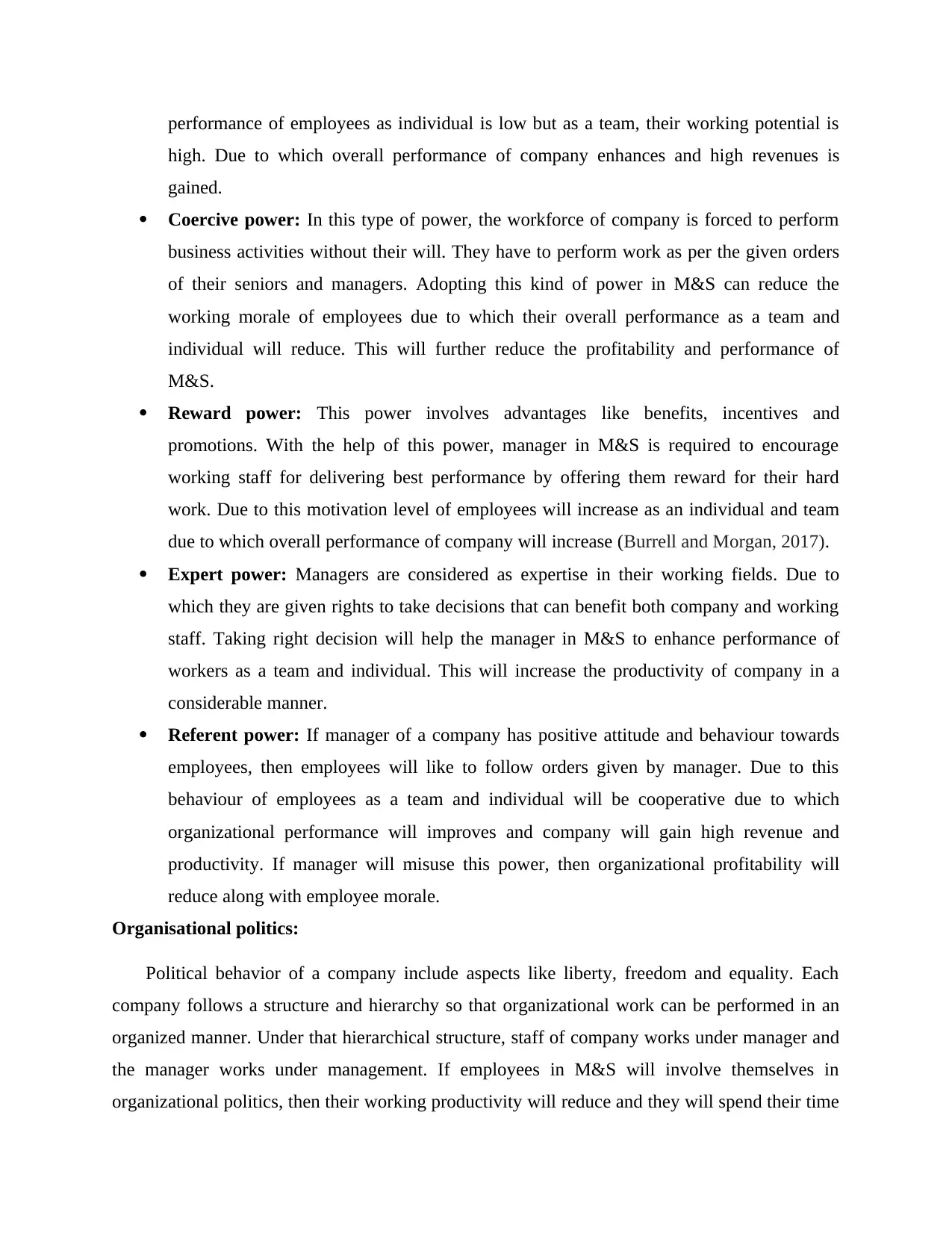
performance of employees as individual is low but as a team, their working potential is
high. Due to which overall performance of company enhances and high revenues is
gained.
Coercive power: In this type of power, the workforce of company is forced to perform
business activities without their will. They have to perform work as per the given orders
of their seniors and managers. Adopting this kind of power in M&S can reduce the
working morale of employees due to which their overall performance as a team and
individual will reduce. This will further reduce the profitability and performance of
M&S.
Reward power: This power involves advantages like benefits, incentives and
promotions. With the help of this power, manager in M&S is required to encourage
working staff for delivering best performance by offering them reward for their hard
work. Due to this motivation level of employees will increase as an individual and team
due to which overall performance of company will increase (Burrell and Morgan, 2017).
Expert power: Managers are considered as expertise in their working fields. Due to
which they are given rights to take decisions that can benefit both company and working
staff. Taking right decision will help the manager in M&S to enhance performance of
workers as a team and individual. This will increase the productivity of company in a
considerable manner.
Referent power: If manager of a company has positive attitude and behaviour towards
employees, then employees will like to follow orders given by manager. Due to this
behaviour of employees as a team and individual will be cooperative due to which
organizational performance will improves and company will gain high revenue and
productivity. If manager will misuse this power, then organizational profitability will
reduce along with employee morale.
Organisational politics:
Political behavior of a company include aspects like liberty, freedom and equality. Each
company follows a structure and hierarchy so that organizational work can be performed in an
organized manner. Under that hierarchical structure, staff of company works under manager and
the manager works under management. If employees in M&S will involve themselves in
organizational politics, then their working productivity will reduce and they will spend their time
high. Due to which overall performance of company enhances and high revenues is
gained.
Coercive power: In this type of power, the workforce of company is forced to perform
business activities without their will. They have to perform work as per the given orders
of their seniors and managers. Adopting this kind of power in M&S can reduce the
working morale of employees due to which their overall performance as a team and
individual will reduce. This will further reduce the profitability and performance of
M&S.
Reward power: This power involves advantages like benefits, incentives and
promotions. With the help of this power, manager in M&S is required to encourage
working staff for delivering best performance by offering them reward for their hard
work. Due to this motivation level of employees will increase as an individual and team
due to which overall performance of company will increase (Burrell and Morgan, 2017).
Expert power: Managers are considered as expertise in their working fields. Due to
which they are given rights to take decisions that can benefit both company and working
staff. Taking right decision will help the manager in M&S to enhance performance of
workers as a team and individual. This will increase the productivity of company in a
considerable manner.
Referent power: If manager of a company has positive attitude and behaviour towards
employees, then employees will like to follow orders given by manager. Due to this
behaviour of employees as a team and individual will be cooperative due to which
organizational performance will improves and company will gain high revenue and
productivity. If manager will misuse this power, then organizational profitability will
reduce along with employee morale.
Organisational politics:
Political behavior of a company include aspects like liberty, freedom and equality. Each
company follows a structure and hierarchy so that organizational work can be performed in an
organized manner. Under that hierarchical structure, staff of company works under manager and
the manager works under management. If employees in M&S will involve themselves in
organizational politics, then their working productivity will reduce and they will spend their time
⊘ This is a preview!⊘
Do you want full access?
Subscribe today to unlock all pages.

Trusted by 1+ million students worldwide
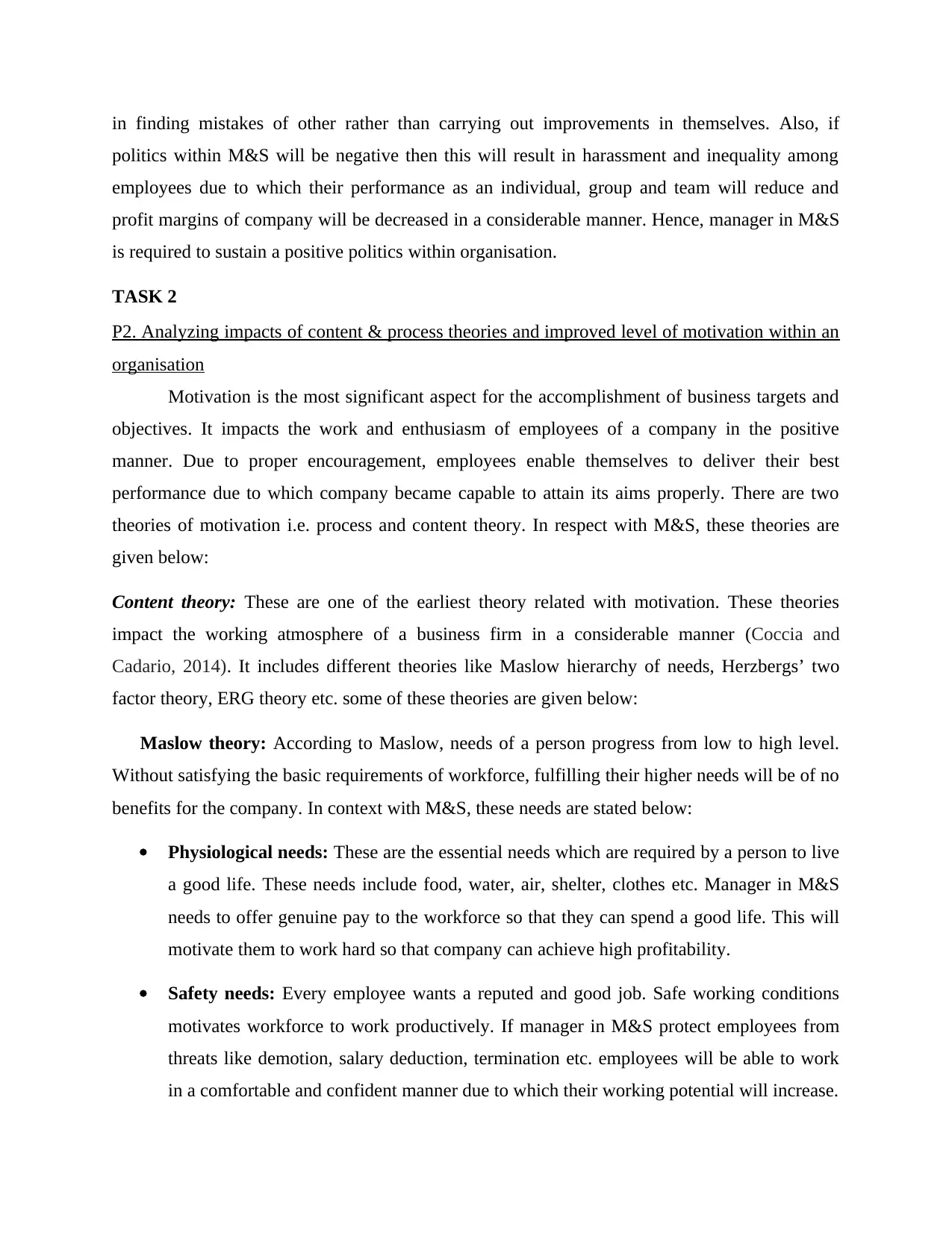
in finding mistakes of other rather than carrying out improvements in themselves. Also, if
politics within M&S will be negative then this will result in harassment and inequality among
employees due to which their performance as an individual, group and team will reduce and
profit margins of company will be decreased in a considerable manner. Hence, manager in M&S
is required to sustain a positive politics within organisation.
TASK 2
P2. Analyzing impacts of content & process theories and improved level of motivation within an
organisation
Motivation is the most significant aspect for the accomplishment of business targets and
objectives. It impacts the work and enthusiasm of employees of a company in the positive
manner. Due to proper encouragement, employees enable themselves to deliver their best
performance due to which company became capable to attain its aims properly. There are two
theories of motivation i.e. process and content theory. In respect with M&S, these theories are
given below:
Content theory: These are one of the earliest theory related with motivation. These theories
impact the working atmosphere of a business firm in a considerable manner (Coccia and
Cadario, 2014). It includes different theories like Maslow hierarchy of needs, Herzbergs’ two
factor theory, ERG theory etc. some of these theories are given below:
Maslow theory: According to Maslow, needs of a person progress from low to high level.
Without satisfying the basic requirements of workforce, fulfilling their higher needs will be of no
benefits for the company. In context with M&S, these needs are stated below:
Physiological needs: These are the essential needs which are required by a person to live
a good life. These needs include food, water, air, shelter, clothes etc. Manager in M&S
needs to offer genuine pay to the workforce so that they can spend a good life. This will
motivate them to work hard so that company can achieve high profitability.
Safety needs: Every employee wants a reputed and good job. Safe working conditions
motivates workforce to work productively. If manager in M&S protect employees from
threats like demotion, salary deduction, termination etc. employees will be able to work
in a comfortable and confident manner due to which their working potential will increase.
politics within M&S will be negative then this will result in harassment and inequality among
employees due to which their performance as an individual, group and team will reduce and
profit margins of company will be decreased in a considerable manner. Hence, manager in M&S
is required to sustain a positive politics within organisation.
TASK 2
P2. Analyzing impacts of content & process theories and improved level of motivation within an
organisation
Motivation is the most significant aspect for the accomplishment of business targets and
objectives. It impacts the work and enthusiasm of employees of a company in the positive
manner. Due to proper encouragement, employees enable themselves to deliver their best
performance due to which company became capable to attain its aims properly. There are two
theories of motivation i.e. process and content theory. In respect with M&S, these theories are
given below:
Content theory: These are one of the earliest theory related with motivation. These theories
impact the working atmosphere of a business firm in a considerable manner (Coccia and
Cadario, 2014). It includes different theories like Maslow hierarchy of needs, Herzbergs’ two
factor theory, ERG theory etc. some of these theories are given below:
Maslow theory: According to Maslow, needs of a person progress from low to high level.
Without satisfying the basic requirements of workforce, fulfilling their higher needs will be of no
benefits for the company. In context with M&S, these needs are stated below:
Physiological needs: These are the essential needs which are required by a person to live
a good life. These needs include food, water, air, shelter, clothes etc. Manager in M&S
needs to offer genuine pay to the workforce so that they can spend a good life. This will
motivate them to work hard so that company can achieve high profitability.
Safety needs: Every employee wants a reputed and good job. Safe working conditions
motivates workforce to work productively. If manager in M&S protect employees from
threats like demotion, salary deduction, termination etc. employees will be able to work
in a comfortable and confident manner due to which their working potential will increase.
Paraphrase This Document
Need a fresh take? Get an instant paraphrase of this document with our AI Paraphraser
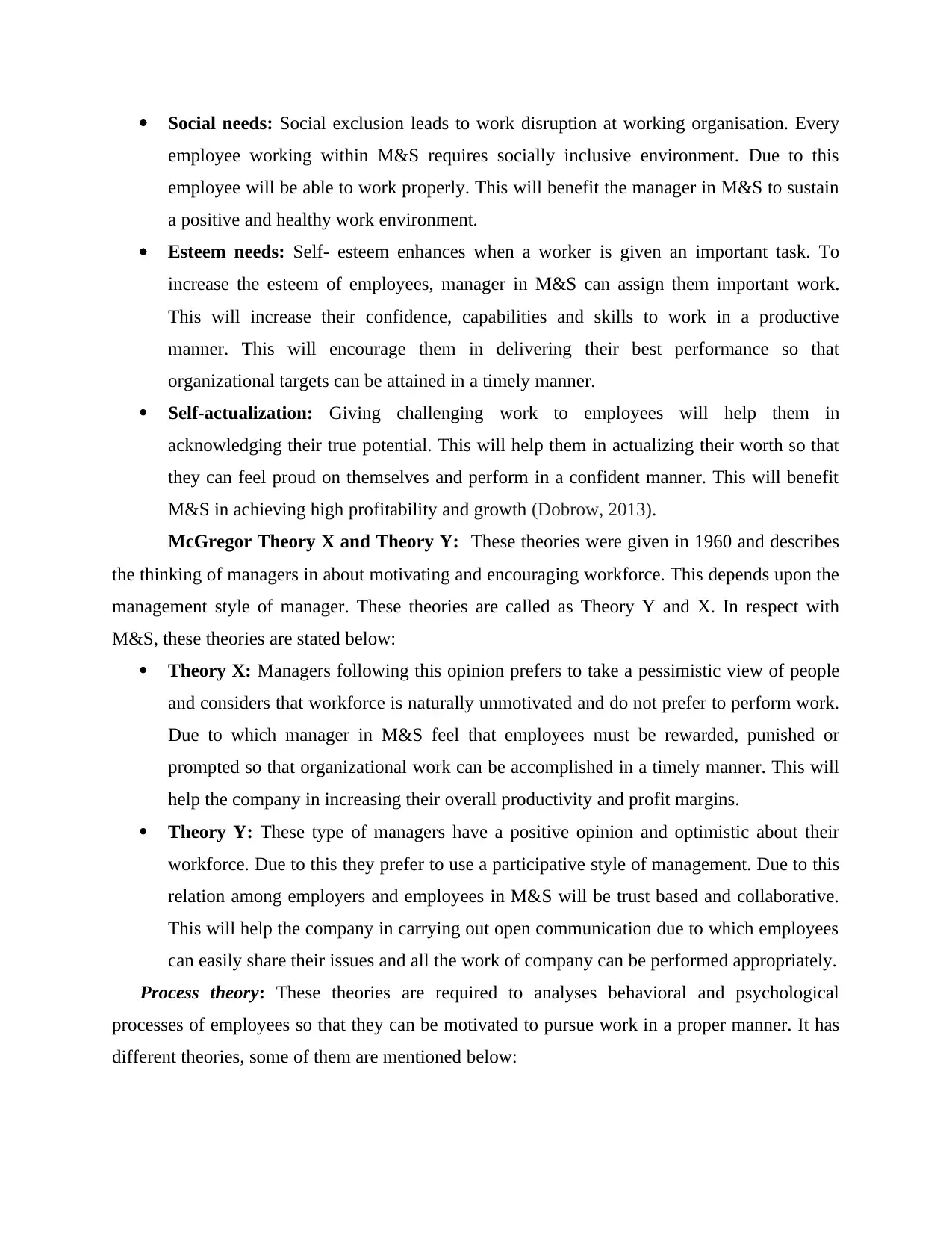
Social needs: Social exclusion leads to work disruption at working organisation. Every
employee working within M&S requires socially inclusive environment. Due to this
employee will be able to work properly. This will benefit the manager in M&S to sustain
a positive and healthy work environment.
Esteem needs: Self- esteem enhances when a worker is given an important task. To
increase the esteem of employees, manager in M&S can assign them important work.
This will increase their confidence, capabilities and skills to work in a productive
manner. This will encourage them in delivering their best performance so that
organizational targets can be attained in a timely manner.
Self-actualization: Giving challenging work to employees will help them in
acknowledging their true potential. This will help them in actualizing their worth so that
they can feel proud on themselves and perform in a confident manner. This will benefit
M&S in achieving high profitability and growth (Dobrow, 2013).
McGregor Theory X and Theory Y: These theories were given in 1960 and describes
the thinking of managers in about motivating and encouraging workforce. This depends upon the
management style of manager. These theories are called as Theory Y and X. In respect with
M&S, these theories are stated below:
Theory X: Managers following this opinion prefers to take a pessimistic view of people
and considers that workforce is naturally unmotivated and do not prefer to perform work.
Due to which manager in M&S feel that employees must be rewarded, punished or
prompted so that organizational work can be accomplished in a timely manner. This will
help the company in increasing their overall productivity and profit margins.
Theory Y: These type of managers have a positive opinion and optimistic about their
workforce. Due to this they prefer to use a participative style of management. Due to this
relation among employers and employees in M&S will be trust based and collaborative.
This will help the company in carrying out open communication due to which employees
can easily share their issues and all the work of company can be performed appropriately.
Process theory: These theories are required to analyses behavioral and psychological
processes of employees so that they can be motivated to pursue work in a proper manner. It has
different theories, some of them are mentioned below:
employee working within M&S requires socially inclusive environment. Due to this
employee will be able to work properly. This will benefit the manager in M&S to sustain
a positive and healthy work environment.
Esteem needs: Self- esteem enhances when a worker is given an important task. To
increase the esteem of employees, manager in M&S can assign them important work.
This will increase their confidence, capabilities and skills to work in a productive
manner. This will encourage them in delivering their best performance so that
organizational targets can be attained in a timely manner.
Self-actualization: Giving challenging work to employees will help them in
acknowledging their true potential. This will help them in actualizing their worth so that
they can feel proud on themselves and perform in a confident manner. This will benefit
M&S in achieving high profitability and growth (Dobrow, 2013).
McGregor Theory X and Theory Y: These theories were given in 1960 and describes
the thinking of managers in about motivating and encouraging workforce. This depends upon the
management style of manager. These theories are called as Theory Y and X. In respect with
M&S, these theories are stated below:
Theory X: Managers following this opinion prefers to take a pessimistic view of people
and considers that workforce is naturally unmotivated and do not prefer to perform work.
Due to which manager in M&S feel that employees must be rewarded, punished or
prompted so that organizational work can be accomplished in a timely manner. This will
help the company in increasing their overall productivity and profit margins.
Theory Y: These type of managers have a positive opinion and optimistic about their
workforce. Due to this they prefer to use a participative style of management. Due to this
relation among employers and employees in M&S will be trust based and collaborative.
This will help the company in carrying out open communication due to which employees
can easily share their issues and all the work of company can be performed appropriately.
Process theory: These theories are required to analyses behavioral and psychological
processes of employees so that they can be motivated to pursue work in a proper manner. It has
different theories, some of them are mentioned below:
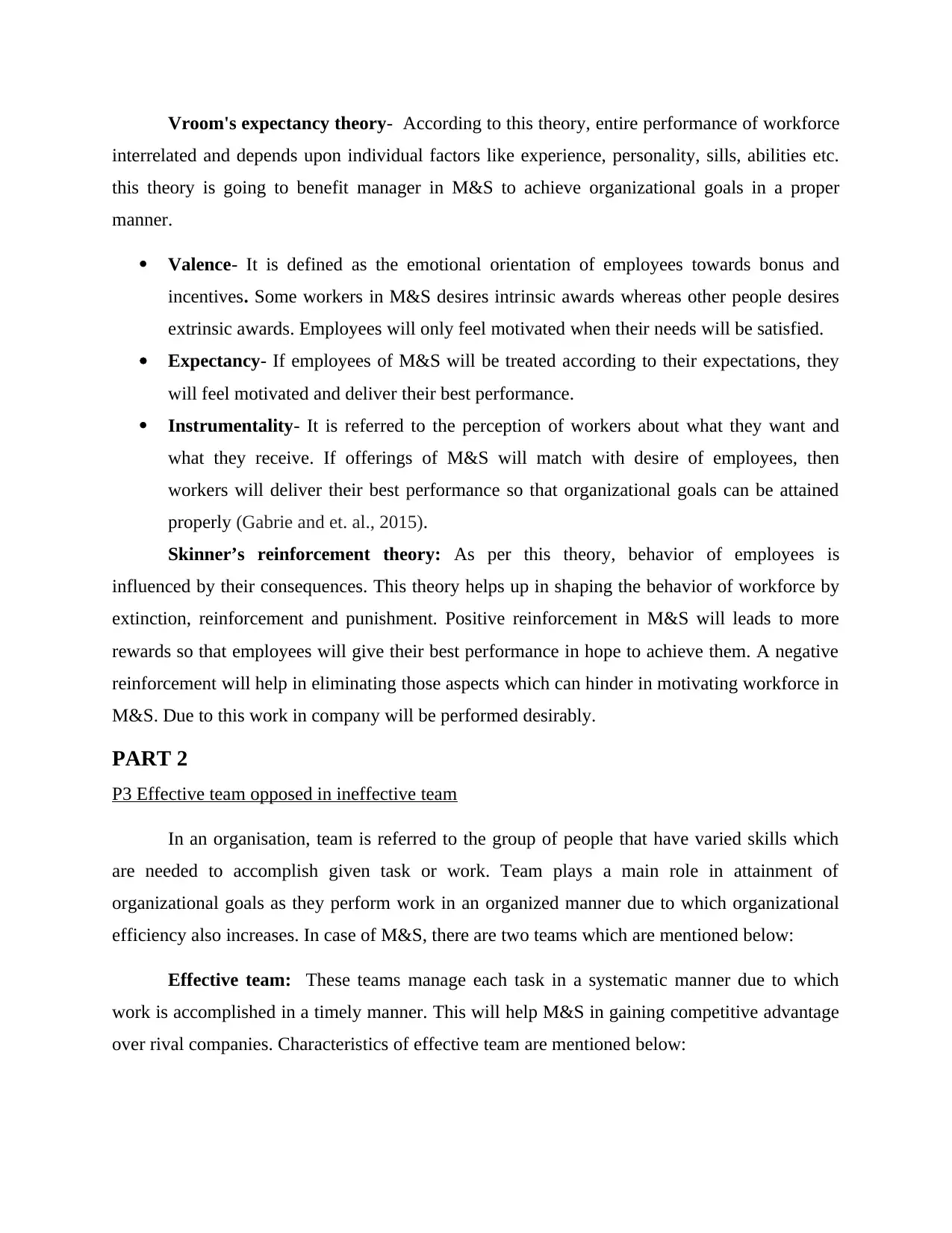
Vroom's expectancy theory- According to this theory, entire performance of workforce
interrelated and depends upon individual factors like experience, personality, sills, abilities etc.
this theory is going to benefit manager in M&S to achieve organizational goals in a proper
manner.
Valence- It is defined as the emotional orientation of employees towards bonus and
incentives. Some workers in M&S desires intrinsic awards whereas other people desires
extrinsic awards. Employees will only feel motivated when their needs will be satisfied.
Expectancy- If employees of M&S will be treated according to their expectations, they
will feel motivated and deliver their best performance.
Instrumentality- It is referred to the perception of workers about what they want and
what they receive. If offerings of M&S will match with desire of employees, then
workers will deliver their best performance so that organizational goals can be attained
properly (Gabrie and et. al., 2015).
Skinner’s reinforcement theory: As per this theory, behavior of employees is
influenced by their consequences. This theory helps up in shaping the behavior of workforce by
extinction, reinforcement and punishment. Positive reinforcement in M&S will leads to more
rewards so that employees will give their best performance in hope to achieve them. A negative
reinforcement will help in eliminating those aspects which can hinder in motivating workforce in
M&S. Due to this work in company will be performed desirably.
PART 2
P3 Effective team opposed in ineffective team
In an organisation, team is referred to the group of people that have varied skills which
are needed to accomplish given task or work. Team plays a main role in attainment of
organizational goals as they perform work in an organized manner due to which organizational
efficiency also increases. In case of M&S, there are two teams which are mentioned below:
Effective team: These teams manage each task in a systematic manner due to which
work is accomplished in a timely manner. This will help M&S in gaining competitive advantage
over rival companies. Characteristics of effective team are mentioned below:
interrelated and depends upon individual factors like experience, personality, sills, abilities etc.
this theory is going to benefit manager in M&S to achieve organizational goals in a proper
manner.
Valence- It is defined as the emotional orientation of employees towards bonus and
incentives. Some workers in M&S desires intrinsic awards whereas other people desires
extrinsic awards. Employees will only feel motivated when their needs will be satisfied.
Expectancy- If employees of M&S will be treated according to their expectations, they
will feel motivated and deliver their best performance.
Instrumentality- It is referred to the perception of workers about what they want and
what they receive. If offerings of M&S will match with desire of employees, then
workers will deliver their best performance so that organizational goals can be attained
properly (Gabrie and et. al., 2015).
Skinner’s reinforcement theory: As per this theory, behavior of employees is
influenced by their consequences. This theory helps up in shaping the behavior of workforce by
extinction, reinforcement and punishment. Positive reinforcement in M&S will leads to more
rewards so that employees will give their best performance in hope to achieve them. A negative
reinforcement will help in eliminating those aspects which can hinder in motivating workforce in
M&S. Due to this work in company will be performed desirably.
PART 2
P3 Effective team opposed in ineffective team
In an organisation, team is referred to the group of people that have varied skills which
are needed to accomplish given task or work. Team plays a main role in attainment of
organizational goals as they perform work in an organized manner due to which organizational
efficiency also increases. In case of M&S, there are two teams which are mentioned below:
Effective team: These teams manage each task in a systematic manner due to which
work is accomplished in a timely manner. This will help M&S in gaining competitive advantage
over rival companies. Characteristics of effective team are mentioned below:
⊘ This is a preview!⊘
Do you want full access?
Subscribe today to unlock all pages.

Trusted by 1+ million students worldwide
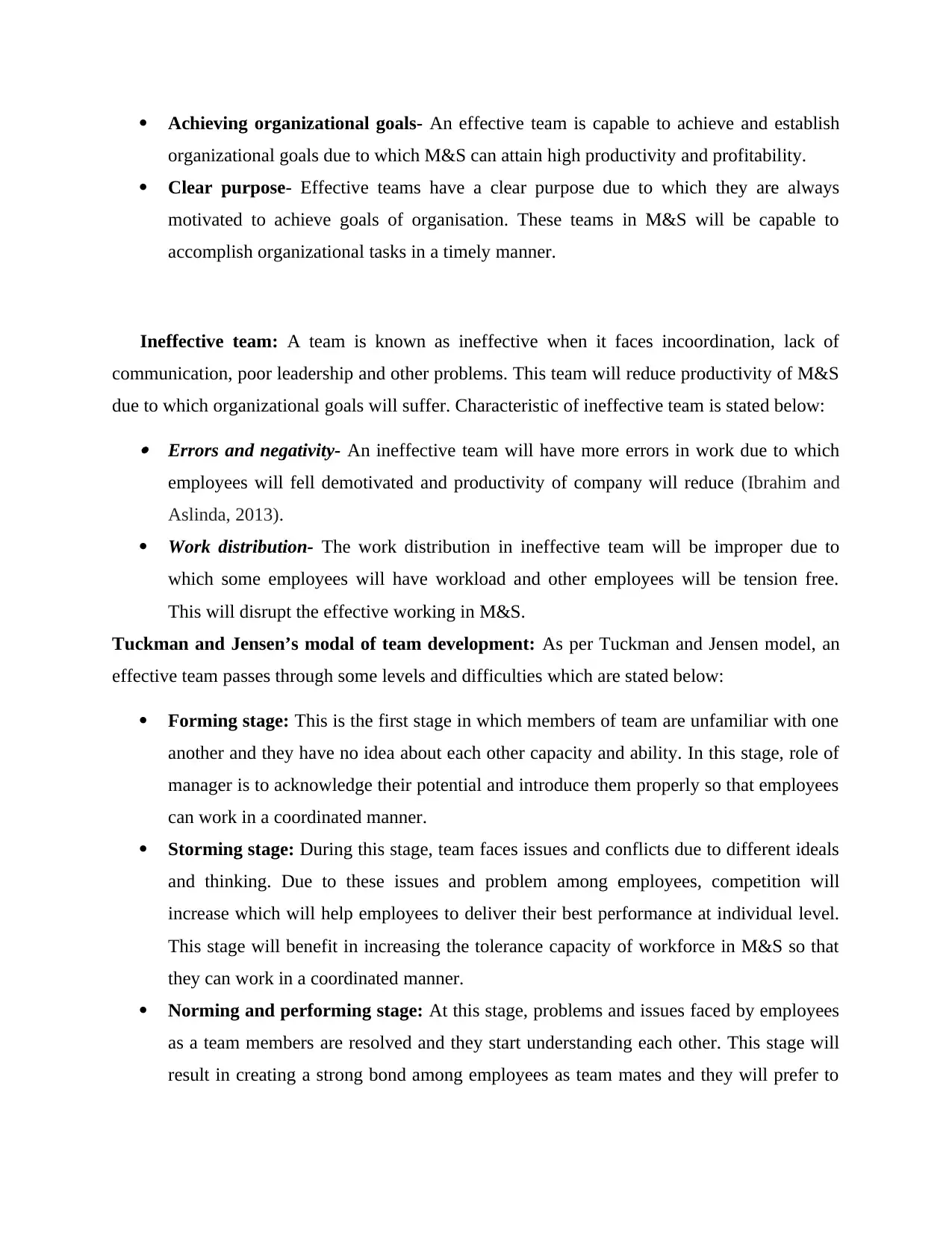
Achieving organizational goals- An effective team is capable to achieve and establish
organizational goals due to which M&S can attain high productivity and profitability.
Clear purpose- Effective teams have a clear purpose due to which they are always
motivated to achieve goals of organisation. These teams in M&S will be capable to
accomplish organizational tasks in a timely manner.
Ineffective team: A team is known as ineffective when it faces incoordination, lack of
communication, poor leadership and other problems. This team will reduce productivity of M&S
due to which organizational goals will suffer. Characteristic of ineffective team is stated below: Errors and negativity- An ineffective team will have more errors in work due to which
employees will fell demotivated and productivity of company will reduce (Ibrahim and
Aslinda, 2013).
Work distribution- The work distribution in ineffective team will be improper due to
which some employees will have workload and other employees will be tension free.
This will disrupt the effective working in M&S.
Tuckman and Jensen’s modal of team development: As per Tuckman and Jensen model, an
effective team passes through some levels and difficulties which are stated below:
Forming stage: This is the first stage in which members of team are unfamiliar with one
another and they have no idea about each other capacity and ability. In this stage, role of
manager is to acknowledge their potential and introduce them properly so that employees
can work in a coordinated manner.
Storming stage: During this stage, team faces issues and conflicts due to different ideals
and thinking. Due to these issues and problem among employees, competition will
increase which will help employees to deliver their best performance at individual level.
This stage will benefit in increasing the tolerance capacity of workforce in M&S so that
they can work in a coordinated manner.
Norming and performing stage: At this stage, problems and issues faced by employees
as a team members are resolved and they start understanding each other. This stage will
result in creating a strong bond among employees as team mates and they will prefer to
organizational goals due to which M&S can attain high productivity and profitability.
Clear purpose- Effective teams have a clear purpose due to which they are always
motivated to achieve goals of organisation. These teams in M&S will be capable to
accomplish organizational tasks in a timely manner.
Ineffective team: A team is known as ineffective when it faces incoordination, lack of
communication, poor leadership and other problems. This team will reduce productivity of M&S
due to which organizational goals will suffer. Characteristic of ineffective team is stated below: Errors and negativity- An ineffective team will have more errors in work due to which
employees will fell demotivated and productivity of company will reduce (Ibrahim and
Aslinda, 2013).
Work distribution- The work distribution in ineffective team will be improper due to
which some employees will have workload and other employees will be tension free.
This will disrupt the effective working in M&S.
Tuckman and Jensen’s modal of team development: As per Tuckman and Jensen model, an
effective team passes through some levels and difficulties which are stated below:
Forming stage: This is the first stage in which members of team are unfamiliar with one
another and they have no idea about each other capacity and ability. In this stage, role of
manager is to acknowledge their potential and introduce them properly so that employees
can work in a coordinated manner.
Storming stage: During this stage, team faces issues and conflicts due to different ideals
and thinking. Due to these issues and problem among employees, competition will
increase which will help employees to deliver their best performance at individual level.
This stage will benefit in increasing the tolerance capacity of workforce in M&S so that
they can work in a coordinated manner.
Norming and performing stage: At this stage, problems and issues faced by employees
as a team members are resolved and they start understanding each other. This stage will
result in creating a strong bond among employees as team mates and they will prefer to
Paraphrase This Document
Need a fresh take? Get an instant paraphrase of this document with our AI Paraphraser
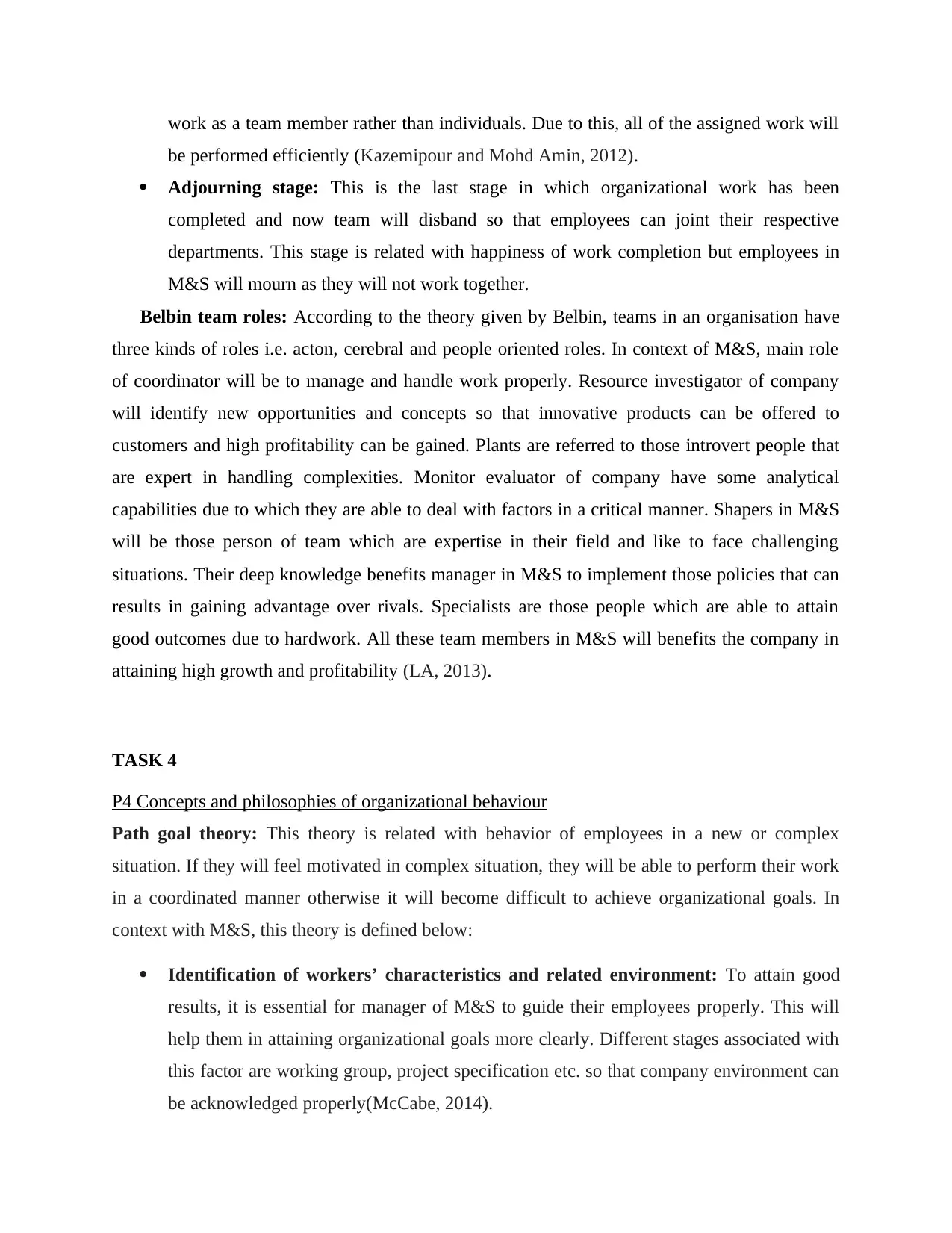
work as a team member rather than individuals. Due to this, all of the assigned work will
be performed efficiently (Kazemipour and Mohd Amin, 2012).
Adjourning stage: This is the last stage in which organizational work has been
completed and now team will disband so that employees can joint their respective
departments. This stage is related with happiness of work completion but employees in
M&S will mourn as they will not work together.
Belbin team roles: According to the theory given by Belbin, teams in an organisation have
three kinds of roles i.e. acton, cerebral and people oriented roles. In context of M&S, main role
of coordinator will be to manage and handle work properly. Resource investigator of company
will identify new opportunities and concepts so that innovative products can be offered to
customers and high profitability can be gained. Plants are referred to those introvert people that
are expert in handling complexities. Monitor evaluator of company have some analytical
capabilities due to which they are able to deal with factors in a critical manner. Shapers in M&S
will be those person of team which are expertise in their field and like to face challenging
situations. Their deep knowledge benefits manager in M&S to implement those policies that can
results in gaining advantage over rivals. Specialists are those people which are able to attain
good outcomes due to hardwork. All these team members in M&S will benefits the company in
attaining high growth and profitability (LA, 2013).
TASK 4
P4 Concepts and philosophies of organizational behaviour
Path goal theory: This theory is related with behavior of employees in a new or complex
situation. If they will feel motivated in complex situation, they will be able to perform their work
in a coordinated manner otherwise it will become difficult to achieve organizational goals. In
context with M&S, this theory is defined below:
Identification of workers’ characteristics and related environment: To attain good
results, it is essential for manager of M&S to guide their employees properly. This will
help them in attaining organizational goals more clearly. Different stages associated with
this factor are working group, project specification etc. so that company environment can
be acknowledged properly(McCabe, 2014).
be performed efficiently (Kazemipour and Mohd Amin, 2012).
Adjourning stage: This is the last stage in which organizational work has been
completed and now team will disband so that employees can joint their respective
departments. This stage is related with happiness of work completion but employees in
M&S will mourn as they will not work together.
Belbin team roles: According to the theory given by Belbin, teams in an organisation have
three kinds of roles i.e. acton, cerebral and people oriented roles. In context of M&S, main role
of coordinator will be to manage and handle work properly. Resource investigator of company
will identify new opportunities and concepts so that innovative products can be offered to
customers and high profitability can be gained. Plants are referred to those introvert people that
are expert in handling complexities. Monitor evaluator of company have some analytical
capabilities due to which they are able to deal with factors in a critical manner. Shapers in M&S
will be those person of team which are expertise in their field and like to face challenging
situations. Their deep knowledge benefits manager in M&S to implement those policies that can
results in gaining advantage over rivals. Specialists are those people which are able to attain
good outcomes due to hardwork. All these team members in M&S will benefits the company in
attaining high growth and profitability (LA, 2013).
TASK 4
P4 Concepts and philosophies of organizational behaviour
Path goal theory: This theory is related with behavior of employees in a new or complex
situation. If they will feel motivated in complex situation, they will be able to perform their work
in a coordinated manner otherwise it will become difficult to achieve organizational goals. In
context with M&S, this theory is defined below:
Identification of workers’ characteristics and related environment: To attain good
results, it is essential for manager of M&S to guide their employees properly. This will
help them in attaining organizational goals more clearly. Different stages associated with
this factor are working group, project specification etc. so that company environment can
be acknowledged properly(McCabe, 2014).
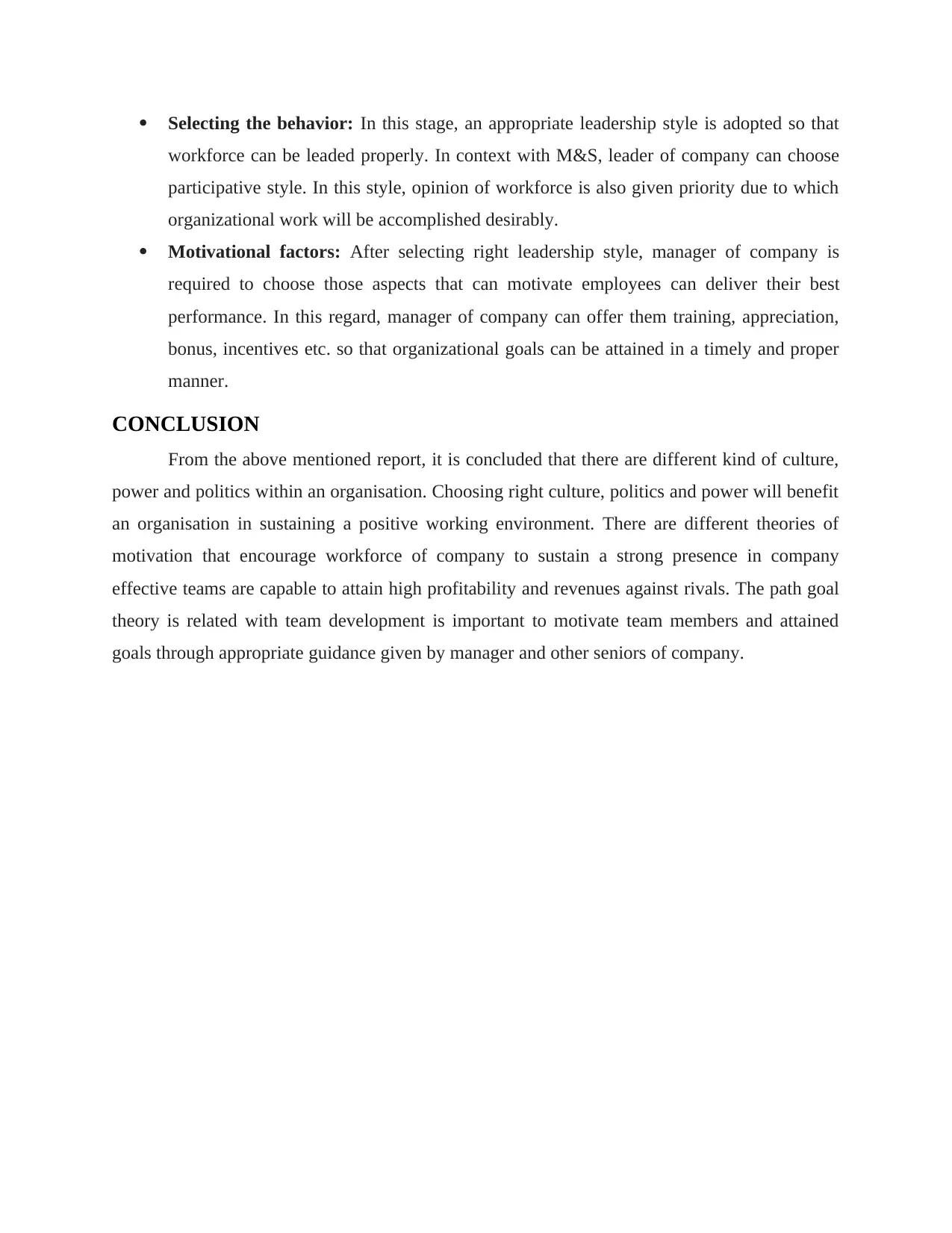
Selecting the behavior: In this stage, an appropriate leadership style is adopted so that
workforce can be leaded properly. In context with M&S, leader of company can choose
participative style. In this style, opinion of workforce is also given priority due to which
organizational work will be accomplished desirably.
Motivational factors: After selecting right leadership style, manager of company is
required to choose those aspects that can motivate employees can deliver their best
performance. In this regard, manager of company can offer them training, appreciation,
bonus, incentives etc. so that organizational goals can be attained in a timely and proper
manner.
CONCLUSION
From the above mentioned report, it is concluded that there are different kind of culture,
power and politics within an organisation. Choosing right culture, politics and power will benefit
an organisation in sustaining a positive working environment. There are different theories of
motivation that encourage workforce of company to sustain a strong presence in company
effective teams are capable to attain high profitability and revenues against rivals. The path goal
theory is related with team development is important to motivate team members and attained
goals through appropriate guidance given by manager and other seniors of company.
workforce can be leaded properly. In context with M&S, leader of company can choose
participative style. In this style, opinion of workforce is also given priority due to which
organizational work will be accomplished desirably.
Motivational factors: After selecting right leadership style, manager of company is
required to choose those aspects that can motivate employees can deliver their best
performance. In this regard, manager of company can offer them training, appreciation,
bonus, incentives etc. so that organizational goals can be attained in a timely and proper
manner.
CONCLUSION
From the above mentioned report, it is concluded that there are different kind of culture,
power and politics within an organisation. Choosing right culture, politics and power will benefit
an organisation in sustaining a positive working environment. There are different theories of
motivation that encourage workforce of company to sustain a strong presence in company
effective teams are capable to attain high profitability and revenues against rivals. The path goal
theory is related with team development is important to motivate team members and attained
goals through appropriate guidance given by manager and other seniors of company.
⊘ This is a preview!⊘
Do you want full access?
Subscribe today to unlock all pages.

Trusted by 1+ million students worldwide
1 out of 14
Related Documents
Your All-in-One AI-Powered Toolkit for Academic Success.
+13062052269
info@desklib.com
Available 24*7 on WhatsApp / Email
![[object Object]](/_next/static/media/star-bottom.7253800d.svg)
Unlock your academic potential
Copyright © 2020–2026 A2Z Services. All Rights Reserved. Developed and managed by ZUCOL.





